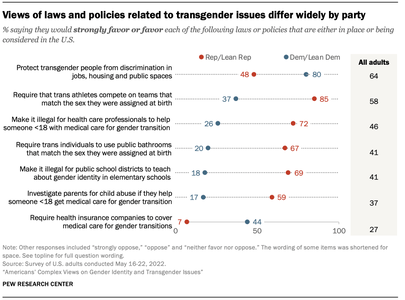Your reply confirms the deeper divide in how we each understand politics. You’re describing a turnout operation. I’m describing a political strategy.
[Note: I removed the bulk of your post as I'm over the character limit. I left the beginning and end so you can reference which post it was.]
I’ll ask again: what, specifically, do you propose Democrats say to these “lean Dem” voters that will succeed where everything else has failed? What message? What emotional hook? Because if all you’ve got is “find the right issue through polling and hope for better turnout,” that’s not a political strategy.
You're correct that I want to win elections. I would love for Dems to sweep the 2028 elections with filibuster-proof majority in the Senate and a massive advantage in the House. But I know that given the geographic and gerrymandered advantages of the Pub across the country, that is nearly impossible to pull off. So I'll stick to trying to figure out a way that we win elections (and the WH and Congress) by actually possible margins in a pragmatic way. If Dems had the Pubs electoral advantages, I might be persuaded to try for bigger aims, but that is not the America we live in.
The difference between is us is that I want to win elections/majorities where possible and limit losses in down years while you want a revolution. You want to go for the big plays because you want to rewrite how society and government works and you need a large group of folks to do that.
Let me be clear about my stance: I am anti-revolution. I am even more deeply anti-populist. Populism is inevitably governance by the worst suited among us plundering the system while blaming others for all of their woes. You can certainly miss me with any sort of populist message if you want me to support your vision.
And our current situation is exactly why I am anti-revolution and anti-populist. Once you question the entirety of the system that oversees the country and those who operate it, you've provided a path for systemic change...but systemic change is very hard to predict and even harder to control. The message that "society/government isn't working for you" can much more easily create the motivation for change without creating the conditions that create positive change. And so the progressive message that "society/government isn't taking care of the working class" helped create the environment that ignored messages and policies coming from more institutionally-minded Dems (and Pubs) that made the 2010s ripe for a revolution...but we got right-wing, authoritarian fascist revolution rather than a progressive revolution. And now we're suffering from the effects of populism and revolution that would have been protected against under more moderate governments (Dem or Pub).
You discuss Obergefell and the success of legalized same-sex marriage...but you act like it was somehow society moving to adopt a different standard. SSM was the result of a nearly 50 year campaign by LGB advocates built on small, incremental change that added up over time. Yes, it was powered by compelling stories and folks coming out to their friends/families millions of times, but it was also built on small governmental actions over decades, as well. That is the kind of governmental actions I typically advocate for; Dem governments that push for incremental change that, over time, creates real societal good. And that is largely because it tends to create the type of sustainable change that lasts, although the revolutionary society/government of the last decade plus continues to threaten those gains.
You say that I don't ask why conservative working class voters vote against their economic interests and that I don't care why they do that. The problem with this view is that I completely ignores that you don't have the damnedest clue about me and what I know about the conservative working class. Let's do a short SnoopRob bio to correct your misunderstandings...
I grew up in a rural, largely white, working class community in NC. My extended family for generations have been working class, rural whites living in this community and nearly all of my friends and neighbors growing up came from very similar families. I left for college in Chapel Hill the expected product of such a community and held views that were largely in line with the folks I grew up with. However, my time in Chapel Hill expanded my views of both the world and people. Almost 15 years ago, i eventually moved back to the county I grew up in here in NC, again surrounded by the conservative working class that makes up the backbone of MAGA. And because my family is here and folks here have known me since I was a baby, I kinda/sorta "pass" and folks are fairly open about why they believe as they do. My county has gone for Trump ~72% in each of the last 3 elections, the majority of folks I intereact with on a daily basis are Trump supporters and most are full-on MAGA. Most of my extended family are MAGA and are certainly dedicated Trump voters/supporters. I don't question why they behave the way they do because I understand it...I was born into these folks, I was raised among these folks, I live among these folks, and I literally am surrounded by these folks on a daily basis.
The biggest reason they vote the way they do is because they are traditionalists who take a very high view of order/structure and believe that society should be structured in a certain way. God/Jesus & the Church are leaders of society...men are superior to women...whites have earned their place at the top of society...cisgendered folks and heterosexuals are "normal" and everyone else is abnormal...married folks are better than single folks...minorities are expected to know their (lower) place and accept that place...self-sufficiency is the norm and one should work for what they have (it's why government programs like disability or payments to farmers are ok, they're for "working folks or those who cannot work any longer" while other government programs are for lazy free-loaders)...work that creates tangible outputs is superior to work that does not. This traditionalist view makes up the foundation of their worldview and, when challenged, they will fight to preserve that worldview and hierarchy against treats to it. Even if that means preserving that worldview at the cost of lower personal economic success. These folks know what it's like to live paycheck-to-paycheck, they'll tighten their belts a little more if they know that they aren't also being replaced in the social order. (It's also why it's not surprising that some Hispanics have moved toward Trumpism. They're ultimately traditionalists, as well, and except for being racial minorities they fit well within the traditionalist worldview. As long as they don't feel in danger of being deported or extremely oppressed by society, they can be - and have been - pursuaded that preserving their overall worldview is more important than the "dangers" of LGBTQ folks and abortion.) Unfortunately, for all of us, this traditionalist view has full devolved into outright bigotry where traditionalists are more concerned with preserving the social order than recognizing the basic rights and humanity of all people.
So that is why I don't believe you can persuade these folks with promises about economic advances unless those economic advances are specifically geared toward them and do not assist (or do not assist as much) those they deem inherently beneath them. Conservative working class folks view themselves as the "backbone of our country" made up of "Real Americans" and others should not be deemed as important as they are. And unless Dems are willing to essentially sell out minority communities to specifically cater to conservative working class folks, then I am highly, highly skeptical that any "persuasive storytelling" is going to actually be persuasive to them. It's also why I don't think that most of the conservative speakers/propagandists that you think connect with this group actually do so in any meaningful way, the connection is based solely on what these folks want to hear and these speakers don't have the power change the minds of folks in this group. The speakers/propagandists can merely flatter them and move them to do things they already desire to do, not actually change their minds or act in novel ways.
As a summation of all of this, I believe that your dream of a political/social revolution based on the working class coming together to concentrate of the "material interests" of the working class is a pipe dream and one that is more likely to lead to negative consequences rather than positive ones. Unless you're willing to cast aside the social concerns - read: basic human rights - of large swaths of minority groups, there is very, very little way you'll convince the traditionalists in the conservative working class to join with working class minorities (much less any other minorities) to vote to adopt your vision, the best you'll do is convince them that they deserve better than what they have and push them further into the arms of authoritarian, right-wing populist movements (which, unsurprisingly, is what we see with Trumpism).



